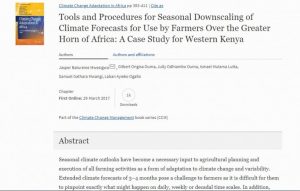Resource

Tools and Procedures for Seasonal Downscaling of Climate Forecasts for Use by Farmers Over the Greater Horn of Africa: A Case Study for Western Kenya
Authors: Jasper Batureine Mwesigwa, Gilbert Ongisa Ouma, Jully Odhiambo Ouma, Ismael Mulama Lutta
Date: 2017
Type: Journal Article
Abstract:
Seasonal climate outlooks have become a necessary input to agricultural planning and execution of all farming activities as a form of adaptation to climate change and variability. Extended climate forecasts of 3–4 months pose a challenge to farmers as it is difficult for them to pinpoint exactly what might happen on daily, weekly or decadal time scales. In addition, such forecasts are presented in form of probability maps and in very coarse resolution, making them difficult for farmers to comprehend. Community-specific downscaled forecasts offer an opportunity for farmers to decide on what, where and when to plant, allocation of resources and on other investment options. This study evaluated various downscaling tools and procedures for seasonal forecast interpretation over the Greater Horn of Africa (GHA) region. The tools evaluated were: analogue year approach, Fact-Fit tool, Water Requirement Satisfaction Index (WRSI) and GeoCLIM tool. Analogue year approach turned out to be good but highly dependent on accuracy of the selected year; Fact-Fit tool was able to convert the seasonal probability forecasts into amounts but unable to disaggregate rainfall amounts at daily, weekly or dekadal time scales; the WRSI tool used was limited to a number of crops, seasons and regions but was necessary for monitoring seasonal progress and predicting crop performance. The current GeoCLIM software used was unable to disaggregate rainfall amounts to daily, weekly or dekadal scales but was good for suitability analysis and producing spatial distribution rainfall maps. An integrated approach is therefore desirable for producing more reliable and dependable location-specific seasonal forecasts for direct application by farmers and other agricultural practitioners. This is so important in the Horn of Africa region, where climate change is already affecting populations, and adaptation is seen as a major approach to cope with the impacts of climate change.
